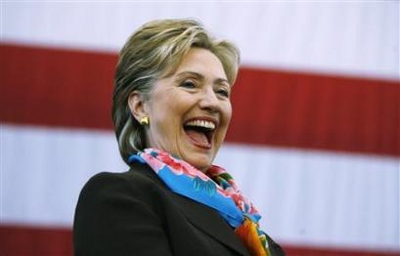Clinton, Obama say the other is being negative
(Agencies)
Updated: 2008-04-21 06:19
Updated: 2008-04-21 06:19
BETHLEHEM, Pennsylvania - With two days to go before a crucial U.S. presidential vote, Democrats Barack Obama and Hillary Clinton campaigned through Pennsylvania on Sunday as the former first lady got the support of one of her fiercest critics.
 Democratic presidential candidate Sen. Hillary Clinton (D-NY) smiles during a rally at Liberty High School in Bethlehem, Pennsylvania, April 20, 2008. [Agencies] |
Tuesday's primary to help pick the Democratic candidate against Republican John McCain in November's presidential election is the first contest in six weeks and has become a major test in the race to the party's nomination.
Clinton, a New York senator, leads in state polls but Obama, an Illinois senator, has cut into her one-time double-digit lead in recent weeks.
With less than 48 hours to go before the polls open, the two campaigned vigorously around the state, both claiming the other was conducting a negative campaign.
At a town hall meeting in Reading, Obama said Clinton believed in "the say-anything, do-anything, special interest-driven politics of Washington -- that that's how it's got to be, that that's how the game is played."
"So you should elect her to be your nominee because she's been in Washington longer and she knows how to play the game better," he said, adding he was a different candidate who would find a common ground.
But at a rally in Bethlehem, Clinton said it was Obama who had gone negative since their Philadelphia debate last week.
"It's no wonder that my opponent has been so negative these last few days of the campaign because I think you saw ... a big difference between us," she said. "It's really a choice of leadership. I'm offering leadership you can count on."
Clinton, who with her husband former President Bill Clinton were the subjects of many conservative investigations when they first entered the White House in 1993, was endorsed on Sunday by the Pittsburgh Tribune-Review whose publisher, Richard Mellon Scaife, funded many of those probes.
The Tribune-Review mentioned Clinton's record and experience in making the choice in the Democratic vote, but also cited her willingness to sit down with the newspaper's editorial board.
"Clinton's decision to sit down with the Trib was courageous, given our long-standing criticism of her," the paper said. "That is no small matter. Political courage is essential in a president. Clinton has demonstrated it. Obama has not."
Margin of Victory
Ahead of Tuesday's Pennsylvania vote, most analysts believed Clinton would win but the size of a victory has become the focus of both campaigns.
Pennsylvania Gov. Edward Rendell, a Clinton backer, pointed out that Obama outspent her by a 3.5-to-1 margin, including more than $2.9 million on television ads in the state last week.
"That's almost obscene," Rendell said on CBS' "Face the Nation." "So to win by four, five, six, seven points under that type of spending differential, that would be a huge and very significant victory."
But Obama's camp responded that she would have to win by much bigger margins in the 10 remaining contests if she is going to catch Obama in the hunt for the 2,024 delegates needed to win the nomination at the party's national convention in August.
"The math is very unforgiving at this point when it comes to delegate counts, and that's what it's all about," said Sen. Richard Durbin, who supports Obama.
"At this point, Senator Clinton needs more than 60 percent of the vote in Pennsylvania," Durbin, Illinois' other senator, said on "Fox News Sunday." Under Democratic rules even losers in presidential contests win some delegates.
McCain, an Arizona senator who has sewed up the Republican nomination, was heading off on a multistate tour of areas hard hit by poverty. Before leaving, he addressed the issue of his temper that was the subject of a front-page Washington Post story on Sunday.
He said on ABC's "This Week" that the examples in the story were decades old, "totally untrue or grossly exaggerated."
"I am very happy to be a passionate man," he said. "I love this country. I love what we stand for and believe in, and many times I deal passionately when I find things that are not in the best interests of the American people."
|
||
|
||
|
|
|
|